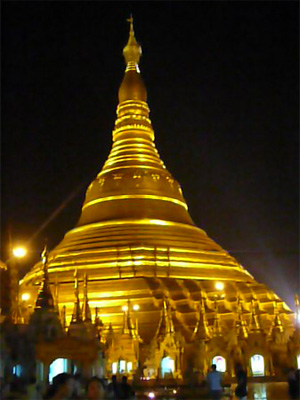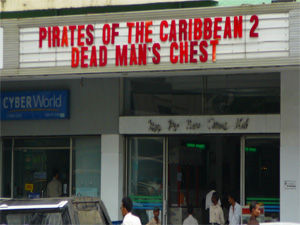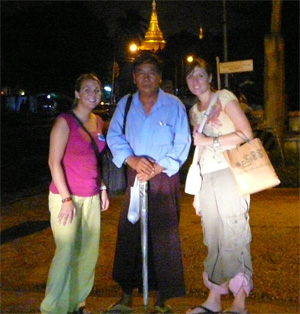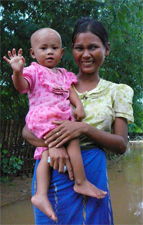TABLE
OF CONTENTS
|
The World's Secret Garden
By Danica Taylor

Myanmar’s
dynamic cultural and
political influences leave it with a very unique structure of
vernacular and
transnational architecture. While walking from our hotel towards the
Shwe Dagon
Pagoda, Sarah, my travel buddy, and I covered a vast majority of
Yangon's
landscapes. There were large beautiful parks, with lakes in the middle
and people
relaxing
along side the water. There were old colonial style buildings that
had been
closed off for decades, giving it a sense of a secret garden, locked
away from the public. They were overrun
with
vines and vegetation; we could barely see the ornate details in some of
the
structures. We also passed old university buildings, although there
were no
signs in front of the gates. As Donald Seekins explained in
“The
State and the City: 1988 and the Transformation of Rangoon,” the
government has been
“changing the symbolic meanings of certain spaces…to sever or
neutralize their
historical connections with revolutionary nationalism” (pg. 2). Yet we
knew
when we
were passing the gates. First of all, as university students, we could
just feel a
campus’ architecture, but more so because while walking along the
sidewalk we
were ushered to the other side of the road by a military man guarding
the
entrance into the area. This was a clear demonstration of the military
junta's
determination to keep their past economic stability behind closed
doors, especially to two
young
American women tourists.
In contrast to the old stark
architecture, there were also transnational corporations like Tokyo
Chicken,
and Tokyo Donuts, with colors and marketing schemes identical to the US
counterparts
of Kentucky Fried Chicken and Dunkin Donuts. These are perfect examples
of
Seekins’ description of the military junta's attempts to open up the
country to
westernization solely for the economic wealth globalization
will
bring to the country (the government). All over the place there were
locals
trying
to sell us everything and anything that would be sold in any other
market.
There was also a local movie theatre that on a Sunday night had a line
of
people around the corner waiting to see Pirate’s
of the Caribbean 2. 
All of
these situations led you to believe that you were in any other
developing nation. There were clear efforts of westernization, but it
was what lay behind these efforts that added a whole other dimension to
the complexity of the country.
The fact
that the
people of the country are not allowed to dress freely, not allowed to
speak
freely, and can’t even travel freely within their country say nothing
about travel outside
of
country borders is appalling. We met a man named “Bobbie” walking up
the
stairs to the Shwe Dagon Pagoda. Later we learned that "Bobbie" was a
retired
electrician. Therefore, he has no income and no job.
There is no such thing as social security or government assistance. Any
and all money that the military junta gets their hads on goes straight
to their pockets, the people see no evidence of any national profits.
Although poor and jobless, "Bobbie" still volunteered to show us around
and enlighten us about the Shwe
Dagon
pagoda and Buddhism.  Every day he comes
to the pagoda to meditate for
about two
hours, he said “it’s the only way I can find clarity in my town that
has
changed so much that I no longer feel I am a part of". Just listening
to him
talk about his life and the challenges he has been faced with was
eye-opening.
He took the two of us out to dinner and while we were drinking tea he
gave each
of us a Kyat bill worth 1kyat. This was the currency used before the
military
junta devalued the money and made the new currency based on 1000
denominations.
On the front of the bill is a photo of Aung San Suu Kyi’s father, the
leader of Burma’s
socialist democracy
prior to his daughter’s attempts toward freeing Burma
into a democratic
nation. Every day he comes
to the pagoda to meditate for
about two
hours, he said “it’s the only way I can find clarity in my town that
has
changed so much that I no longer feel I am a part of". Just listening
to him
talk about his life and the challenges he has been faced with was
eye-opening.
He took the two of us out to dinner and while we were drinking tea he
gave each
of us a Kyat bill worth 1kyat. This was the currency used before the
military
junta devalued the money and made the new currency based on 1000
denominations.
On the front of the bill is a photo of Aung San Suu Kyi’s father, the
leader of Burma’s
socialist democracy
prior to his daughter’s attempts toward freeing Burma
into a democratic
nation.
Although not all these examples
are of
specific architectural elements, I truly feel that they are all
representations of Myanmar
when it was experiencing its first stages of globalization 20 years
ago, before the military seized control over the people. I wrote in my Flaneur’s
diary that it seems Burma
has experienced a digression of transnationalism in the past decade.
Prior to
1988 there was a more significant role of globalization, colonization,
economic trade and wealth than there is now. The buildings, roads,
street
lights, and access to the once largest exporter of rice is
evident. Yangon, Burma
had, and has, all the necessary elements to become a global city. The
military junta has isolated a wonderful place from the world. The
Burmese are the most kind and welcoming people I have ever met, their
country holds so much potential and yet they have so far to come. Burma
to me seems like
the world's secret garden. Secluding all it has to offer and all the
possibilities of success and growth from the world. Burma has all
the necessary elements of being a global nation, but until the
government allows its people the liberty to be free, Burma will remain
as the world's secret garden in my heart.
Flaneur’s
diary that it seems Burma
has experienced a digression of transnationalism in the past decade.
Prior to
1988 there was a more significant role of globalization, colonization,
economic trade and wealth than there is now. The buildings, roads,
street
lights, and access to the once largest exporter of rice is
evident. Yangon, Burma
had, and has, all the necessary elements to become a global city. The
military junta has isolated a wonderful place from the world. The
Burmese are the most kind and welcoming people I have ever met, their
country holds so much potential and yet they have so far to come. Burma
to me seems like
the world's secret garden. Secluding all it has to offer and all the
possibilities of success and growth from the world. Burma has all
the necessary elements of being a global nation, but until the
government allows its people the liberty to be free, Burma will remain
as the world's secret garden in my heart.
|



 Every day he comes
to the pagoda to meditate for
about two
hours, he said “it’s the only way I can find clarity in my town that
has
changed so much that I no longer feel I am a part of". Just listening
to him
talk about his life and the challenges he has been faced with was
eye-opening.
He took the two of us out to dinner and while we were drinking tea he
gave each
of us a Kyat bill worth 1kyat. This was the currency used before the
military
junta devalued the money and made the new currency based on 1000
denominations.
On the front of the bill is a photo of Aung San Suu Kyi’s father, the
leader of
Every day he comes
to the pagoda to meditate for
about two
hours, he said “it’s the only way I can find clarity in my town that
has
changed so much that I no longer feel I am a part of". Just listening
to him
talk about his life and the challenges he has been faced with was
eye-opening.
He took the two of us out to dinner and while we were drinking tea he
gave each
of us a Kyat bill worth 1kyat. This was the currency used before the
military
junta devalued the money and made the new currency based on 1000
denominations.
On the front of the bill is a photo of Aung San Suu Kyi’s father, the
leader of  Flaneur’s
diary that it seems
Flaneur’s
diary that it seems